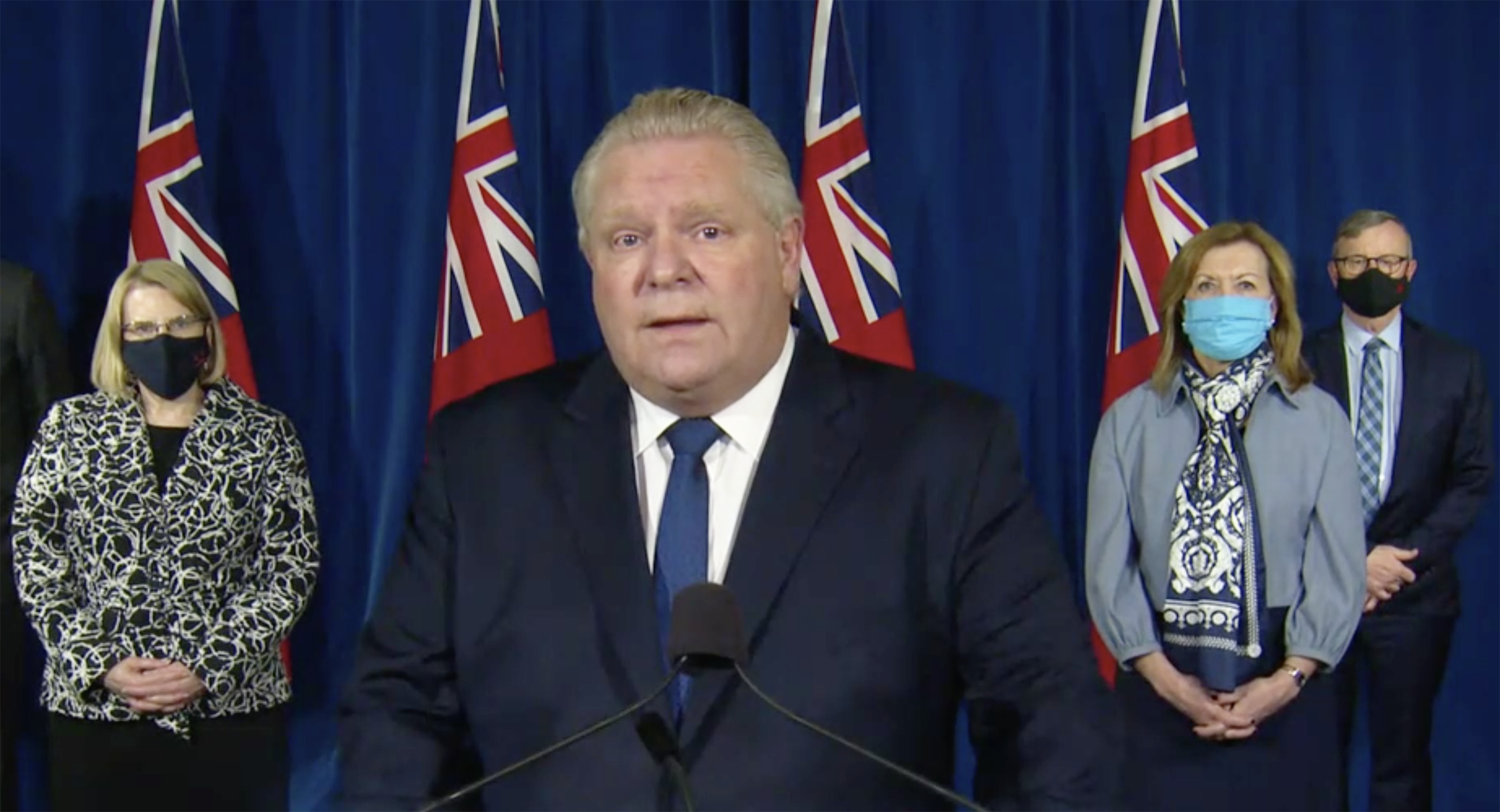TORONTO – Due to a rapid increase in the number of COVID-19 cases across Ontario and the corresponding strain on the health care system, the province has declared a second state of emergency and introduced more strict lockdown measures.
Ontario’s health care system “is on the brink of collapse,” Premier Doug Ford warned at a press conference on Jan. 12.
The government is issuing a stay-at-home order, effective Jan. 14, requiring everyone to remain at home except for essential purposes such as purchasing groceries or medication, accessing health care services, exercise and essential work.
All businesses are also required to ensure employees work from home when possible.
The emergency declaration is in effect until Jan. 26 and the stay-at-home order and other restrictions will be in place until at least Feb. 11.
“The latest modelling data shows that Ontario is in a crisis and, with the current trends, our hospital ICUs will be overwhelmed in a few short weeks, with unthinkable consequences,” said Ford.
“That’s why we are taking urgent and decisive action … By doing the right thing and staying home, you can stay safe and save lives.”
Ford noted about a third of Ontarians have ignored previously-introduced public health guidelines.
Provincial officials say the new measures are aimed at limiting people’s mobility and reducing contact with those outside their own household while the province ramps up its vaccination efforts.
Modelling released earlier in the day on Jan. 12 showed that over the past four weeks, there has been a 69.3 per cent increase in COVID-19 hospitalizations and an 83.1 per cent increase in ICU patients.
There are now more than 400 ICU beds in Ontario occupied with COVID-19 patients and about one quarter of the province’s hospitals have no ICU capacity left, and another quarter have just one or two beds available.
Officials also expressed concern about a new variant of COVID-19, first identified in the United Kingdom, that is more easily transmissible and could begin to rapidly spread in the province.
That could result in much higher case counts, ICU occupancy and mortality, health officials warned.
“Despite our best efforts, COVID-19 is continuing to spread in our communities, our hospitals, our long-term care homes, and our workplaces,” stated deputy premier and health minister Christine Elliott.
“We are continuing to see concerning trends across the province, including a tragic number of deaths. We have made great strides in vaccinating tens of thousands of Ontarians, and we can’t let these efforts go to waste. Urgent action is required to break this deadly trend of transmission, ensure people stay home, and save lives.”
Additional restrictions
The province also announced the following restrictions, which will come into effect between Jan. 12 and 14:
- all outdoor gatherings are restricted to a limit of five people (down from 10) with limited exceptions;
- wearing a mask/face covering is required indoors at businesses/organizations and is recommended outdoors when distancing is not possible;
- all non-essential retail stores, including hardware stores, alcohol retailers and those offering curbside pickup or delivery, must open no earlier than 7am and close by 8pm (this does not apply to grocery stores, pharmacies, gas stations, convenience stores and restaurant takeout/delivery);
- non-essential construction is further restricted.
The emergency declaration provides enforcement and provincial offences officers – police, bylaw officers and provincial workplace inspectors – the authority to issue tickets to individuals who do not comply with the stay-at-home order and mask requirement and to businesses who do not enforce restrictions.
Enforcement personnel will also have the authority to temporarily close a premise and disperse individuals who contravene an order.
“Extraordinary action is needed to protect the health and safety of Ontarians as we deal with this growing crisis,” said Solicitor General Sylvia Jones.
“Our government is providing police and bylaw officers with the tools, and the authority, they need to enforce these critical restrictions and protect public health.”
Schools and child care centres
The province has also announced that schools will not return to in-person instruction until Feb. 10 in Windsor-Essex, Peel, Toronto, Hamilton and York regions. Schools in northern public health units will continue to remain open.
Elsewhere, the province intends to announce by Jan. 20 which public health units can resume in-person learning – currently suspended until Jan. 25 – based on the latest data.
Before- and after-school programs can be offered when in-person instruction resumes.
The province will introduce the following new health and safety measures for in-person learning:
- mandatory masks for Grades 1 to 3 (older students are already required to wear masks);
- requiring masks outdoors;
- enhanced screening protocols; and
- expanded targeted testing.
The government will also implement new health and safety measures in Ontario child care settings to align with school requirements.
For more information on the new COVID-19 restrictions, visit the province’s website.




